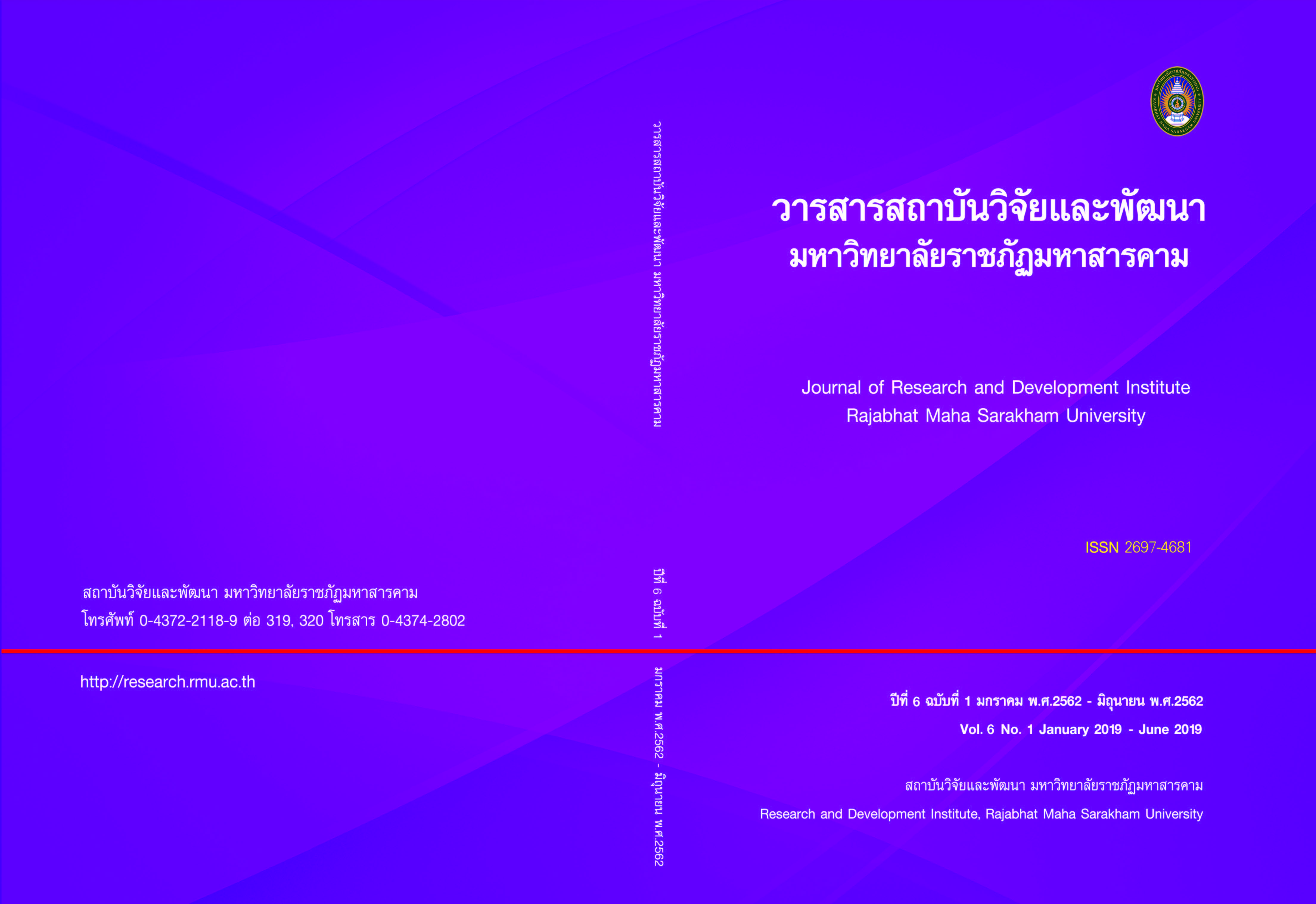21st Century Thinking Skills of Educational Institutions in the Basic Education Institutions Office, Maha Sara kham Province
Keywords:
Skills, Thinking, 21st CenturyAbstract
The purposes of this research were 1) to study the direct, indirect and combined influence of the factors that affect thinking skills of the students in education center under the basic education center in Mahasarakam, 2) construct the form related to thinking skills development of the students, and 3) trial and evaluate the use of the form. The methods were divided into 3 phases. Phase I was a qualitative research. The selected subjects were 400 Prathomsuksa 6 students studying in Mahasarakam. The data were collected by questionnaire and test and analyzed by computer program. Phase II was a qualitative data. The selected subjects were 25 experts, academic staff and related groups by purposive sampling. Phase III was experimental research. The selected were Prathomsuksa 6 students and the data were collected by questionnaire and test. The results revealed that: 1. Causal factors that affect thinking skills of the students were student’s intelligence quotient, motivation, reasoning ability and classroom atmosphere. 2. The experts’ opinions level towards the activities based on the form related to thinking skills development of the students were 4.44 in total average. The experts’ opinions level were highest (5.00) in grouping instructional package. And they were also in 4 activities which were 4.40 in identifying instructional package, 4.40 in applying instructional package, 4.40 in predicting instructional package, and 4.40 in reasoning instructional package. 3. The level of satisfaction towards the form were high (4.31) in average. The highest level was observing and identifying instructional package when taking individual consideration.
References
Bingham,Walter V.D. (1937). Aptitude and Aptitude testing. New York : Harper and Brpthers. Bunchom Srisa-ard. (1992). Basic research principles. 3rd edition, Bangkok : Suweeriyasarn. [in Thai]
Buntham Kitpreedaborisuth. (1994). Techniques for creating data collection tools for research. 4th edition : Bangkok: B and B Publishing. [in Thai]
Department of Academic Affairs. (1996). Secondary education assessment. Educational Testing Office,Department of Academic Affairs : Ministry of Education.
Duangkamol Phonark. (2002). A study of variables affecting critical thinking of Mathayom Suksa III students in Bangkok using Multilevel analysis. Bangkok : Srinakharinwirot University Prasarnmit. [in Thai]
Khajornsak Srisen. (2001). The student-centered of teaching and learning Management. Bangkok : Chulalongkorn University. [in Thai]
Kotler. (2000). Marketing Management. The Millennium Edition. New Jersey: Prentice Hall.
Luan Saiyos and. Angkana Saiyos. (1984). Aptitude measurement. Bangkok: Wattana Phanit. [in Thai]
McClelland, D.C. (1961). The Achievement Motive. New York: Prentice-Hall. Ministry of Education. (2002). Basic Education Curriculum 2001. Bangkok: Cargo and parcel organization Printing House. [in Thai]
Nittaya Sudtajan. (2009). Factors related to analytical thinking ability of the 2nd Grade Students under the Office of Khon Kaen Educational Service Area 5 : Multilevel analysis. Mahasarakrm : Mahasarakrm university. [in Thai]
Office of Education Standards and Quality Assessment, Public organization. (2004). The National Education Act 2542 B.E. Amendment (Issue 2) 2545 B.E.. Bangkok : Office of Education Standards and Quality Assessment. [in Thai]
Office of the Maha Sara kham Educational Service Area Committee. (2011). Basic Level External Quality Evaluation Results, Maha Sara kham province 2006-2010. Maha Sara kham : Office of the Maha Sara kham Educational Service Area Committee. [in Thai]
Phatchrin Santiniyom. (2010). Some selected variables that are related to analytical thinking ability of Student’s Sumrongwitthayakarn School under the Secondary Educational Service Area Office 29. Ubon Ratchathani: Ubon Ratchathani University. [in Thai]
Rattana Kiddee. (2005). Some factors that affect analytical thinking ability of Mattayom 3 students. Songkhla: Thaksin University.
Roid, G. H. (2003). Stanford-Binet intelligence scales. 5th edition. (SB: V). Itasca, IL: Riverside Publishing
Rungsan Singhalert. (2008). Social Science Research Methodology. Maha Sara kham : Rajabhat Maha Sarakham University. [in Thai]
Witphichai Phuangkham. (2008). Development of A Causal Model of Analytical Thinking Ability of Junior high school students. Bangkok: Chulalongkorn University. [in Thai]
Wiyada Phrathumrat. (2008). Factors influencing analytical thinking ability of Mattayom 3 students under the office of Nong Bua Lamphu Educational Service Area Office. Mahasarakrm : Mahasarakrm university. [in Thai]
Woraphot Wongkitrungrueng and Athip Jittaruek. (2011). 21st Century Skills : Rethinking how students learn ; James Bellanca, Ron Brandt : Editors. Bangkok : Openworld. [in Thai]
Wutthakrai Thiengdee. (2006). Factors related to analytical thinking ability of Mattayom 3 students in Kalasin province. Mahasarakrm : Mahasarakrm university. [in Thai]
Yamane, Taro. (1993). Statistics: An Introductory Analysis. 3rd edition. New York: Harper and Row Publications
Downloads
Published
How to Cite
Issue
Section
License
Articles that are published are copyrighted by the authors of the articles







